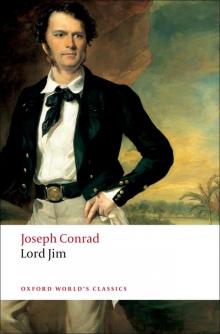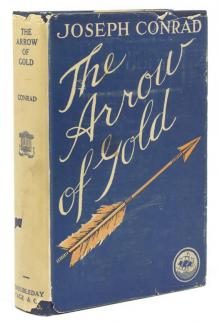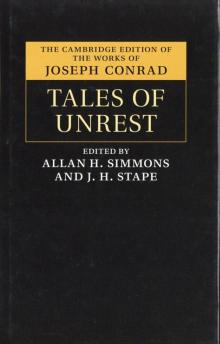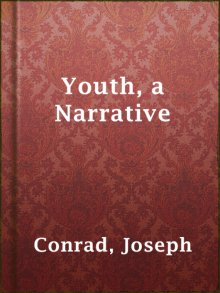- Home
- Joseph Conrad
The Shadow Line: A Confession Page 2
The Shadow Line: A Confession Read online
Page 2
It was imparted to me in a low voice by Captain Giles that this was an officer of some Rajah's yacht which had come into our port to be dry-docked. Must have been "seeing life" last night, he added, wrinkling his nose in an intimate, confidential way which pleased me vastly. For Captain Giles had prestige. He was credited with wonderful adventures and with some mysterious tragedy in his life. And no man had a word to say against him. He continued:
"I remember him first coming ashore here some years ago. Seems only the other day. He was a nice boy. Oh! these nice boys!"
I could not help laughing aloud. He looked startled, then joined in the laugh. "No! No! I didn't mean that," he cried. "What I meant is that some of them do go soft mighty quick out here."
Jocularly I suggested the beastly heat as the first cause. But Captain Giles disclosed himself possessed of a deeper philosophy. Things out East were made easy for white men. That was all right. The difficulty was to go on keeping white, and some of these nice boys did not know how. He gave me a searching look, and in a benevolent, heavy-uncle manner asked point blank:
"Why did you throw up your berth?"
I became angry all of a sudden; for you can understand how exasperating such a question was to a man who didn't know. I said to myself that I ought to shut up that moralist; and to him aloud I said with challenging politeness:
"Why . . . ? Do you disapprove?"
He was too disconcerted to do more than mutter confusedly: "I! . . . In a general way. . . ." and then gave me up. But he retired in good order, under the cover of a heavily humorous remark that he, too, was getting soft, and that this was his time for taking his little siesta—when he was on shore. "Very bad habit. Very bad habit."
There was a simplicity in the man which would have disarmed a touchiness even more youthful than mine. So when next day at tiffin he bent his head toward me and said that he had met my late Captain last evening, adding in an undertone: "He's very sorry you left. He had never had a mate that suited him so well," I answered him earnestly, without any affectation, that I certainly hadn't been so comfortable in any ship or with any commander in all my sea-going days.
"Well—then," he murmured.
"Haven't you heard, Captain Giles, that I intend to go home?"
"Yes," he said benevolently. "I have heard that sort of thing so often before."
"What of that?" I cried. I thought he was the most dull, unimaginative man I had ever met. I don't know what more I would have said, but the much-belated Hamilton came in just then and took his usual seat. So I dropped into a mumble.
"Anyhow, you shall see it done this time."
Hamilton, beautifully shaved, gave Captain Giles a curt nod, but didn't even condescend to raise his eyebrows at me; and when he spoke it was only to tell the Chief Steward that the food on his plate wasn't fit to be set before a gentleman. The individual addressed seemed much too unhappy to groan. He cast his eyes up to the punkah and that was all.
Captain Giles and I got up from the table, and the stranger next to Hamilton followed our example, manoeuvring himself to his feet with difficulty. He, poor fellow, not because he was hungry but I verily believe only to recover his self-respect, had tried to put some of that unworthy food into his mouth. But after dropping his fork twice and generally making a failure of it, he had sat still with an air of intense mortification combined with a ghastly glazed stare. Both Giles and I had avoided looking his way at table.
On the verandah he stopped short on purpose to address to us anxiously a long remark which I failed to understand completely. It sounded like some horrible unknown language. But when Captain Giles, after only an instant for reflection, assured him with homely friendliness, "Aye, to be sure. You are right there," he appeared very much gratified indeed, and went away (pretty straight, too) to seek a distant long chair.
"What was he trying to say?" I asked with disgust.
"I don't know. Mustn't be down too much on a fellow. He's feeling pretty wretched, you may be sure; and to-morrow he'll feel worse yet."
Judging by the man's appearance it seemed impossible. I wondered what sort of complicated debauch had reduced him to that unspeakable condition. Captain Giles' benevolence was spoiled by a curious air of complacency which I disliked. I said with a little laugh:
"Well, he will have you to look after him." He made a deprecatory gesture, sat down, and took up a paper. I did the same. The papers were old and uninteresting, filled up mostly with dreary stereotyped descriptions of Queen Victoria's first jubilee celebrations. Probably we should have quickly fallen into a tropical afternoon doze if it had not been for Hamilton's voice raised in the dining room. He was finishing his tiffin there. The big double doors stood wide open permanently, and he could not have had any idea how near to the doorway our chairs were placed. He was heard in a loud, supercilious tone answering some statement ventured by the Chief Steward.
"I am not going to be rushed into anything. They will be glad enough to get a gentleman I imagine. There is no hurry."
A loud whispering from the Steward succeeded and then again Hamilton was heard with even intenser scorn.
"What? That young ass who fancies himself for having been chief mate with Kent so long? . . . Preposterous."
Giles and I looked at each other. Kent being the came of my late commander, Captain Giles' whisper, "He's talking of you," seemed to me sheer waste of breath. The Chief Steward must have stuck to his point, whatever it was, because Hamilton was heard again more supercilious if possible, and also very emphatic:
"Rubbish, my good man! One doesn't compete with a rank outsider like that. There's plenty of time."
Then there were pushing of chairs, footsteps in the next room, and plaintive expostulations from the Steward, who was pursuing Hamilton, even out of doors through the main entrance.
"That's a very insulting sort of man," remarked Captain Giles—superfluously, I thought. "Very insulting. You haven't offended him in some way, have you?"
"Never spoke to him in my life," I said grumpily. "Can't imagine what he means by competing. He has been trying for my job after I left—and didn't get it. But that isn't exactly competition."
Captain Giles balanced his big benevolent head thoughtfully. "He didn't get it," he repeated very slowly. "No, not likely either, with Kent. Kent is no end sorry you left him. He gives you the name of a good seaman, too."
I flung away the paper I was still holding. I sat up, I slapped the table with my open palm. I wanted to know why he would keep harping on that, my absolutely private affair. It was exasperating, really.
Captain Giles silenced me by the perfect equanimity of his gaze. "Nothing to be annoyed about," he murmured reasonably, with an evident desire to soothe the childish irritation he had aroused. And he was really a man of an appearance so inoffensive that I tried to explain myself as much as I could. I told him that I did not want to hear any more about what was past and gone. It had been very nice while it lasted, but now it was done with I preferred not to talk about it or even think about it. I had made up my mind to go home.
He listened to the whole tirade in a particular lending-the-ear attitude, as if trying to detect a false note in it somewhere; then straightened himself up and appeared to ponder sagaciously over the matter.
"Yes. You told me you meant to go home. Anything in view there?"
Instead of telling him that it was none of his business I said sullenly:
"Nothing that I know of."
I had indeed considered that rather blank side of the situation I had created for myself by leaving suddenly my very satisfactory employment. And I was not very pleased with it. I had it on the tip of my tongue to say that common sense had nothing to do with my action, and that therefore it didn't deserve the interest Captain Giles seemed to be taking in it. But he was puffing at a short wooden pipe now, and looked so guileless, dense, and commonplace, that it seemed hardly worth while to puzzle him either with truth or sarcasm.
He blew a cloud of smoke, then surpri
sed me by a very abrupt: "Paid your passage money yet?"
Overcome by the shameless pertinacity of a man to whom it was rather difficult to be rude, I replied with exaggerated meekness that I had not done so yet. I thought there would be plenty of time to do that to-morrow.
And I was about to turn away, withdrawing my privacy from his fatuous, objectless attempts to test what sort of stuff it was made of, when he laid down his pipe in an extremely significant manner, you know, as if a critical moment had come, and leaned sideways over the table between us.
"Oh! You haven't yet!" He dropped his voice mysteriously. "Well, then I think you ought to know that there's something going on here."
I had never in my life felt more detached from all earthly goings on. Freed from the sea for a time, I preserved the sailor's consciousness of complete independence from all land affairs. How could they concern me? I gazed at Captain Giles' animation with scorn rather than with curiosity.
To his obviously preparatory question whether our Steward had spoken to me that day I said he hadn't. And what's more he would have had precious little encouragement if he had tried to. I didn't want the fellow to speak to me at all.
Unrebuked by my petulance, Captain Giles, with an air of immense sagacity, began to tell me a minute tale about a Harbour Office peon. It was absolutely pointless. A peon was seen walking that morning on the verandah with a letter in his hand. It was in an official envelope. As the habit of these fellows is, he had shown it to the first white man he came across. That man was our friend in the arm-chair. He, as I knew, was not in a state to interest himself in any sublunary matters. He could only wave the peon away. The peon then wandered on along the verandah and came upon Captain Giles, who was there by an extraordinary chance. . . .
At this point he stopped with a profound look. The letter, he continued, was addressed to the Chief Steward. Now what could Captain Ellis, the Master Attendant, want to write to the Steward for? The fellow went every morning, anyhow, to the Harbour Office with his report, for orders or what not. He hadn't been back more than an hour before there was an office peon chasing him with a note. Now what was that for?
And he began to speculate. It was not for this—and it could not be for that. As to that other thing it was unthinkable.
The fatuousness of all this made me stare. If the man had not been somehow a sympathetic personality I would have resented it like an insult. As it was, I felt only sorry for him. Something remarkably earnest in his gaze prevented me from laughing in his face. Neither did I yawn at him. I just stared.
His tone became a shade more mysterious. Directly the fellow (meaning the Steward) got that note he rushed for his hat and bolted out of the house. But it wasn't because the note called him to the Harbour Office. He didn't go there. He was not absent long enough for that. He came darting back in no time, flung his hat away, and raced about the dining room moaning and slapping his forehead. All these exciting facts and manifestations had been observed by Captain Giles. He had, it seems, been meditating upon them ever since.
I began to pity him profoundly. And in a tone which I tried to make as little sarcastic as possible I said that I was glad he had found something to occupy his morning hours.
With his disarming simplicity he made me observe, as if it were a matter of some consequence, how strange it was that he should have spent the morning indoors at all. He generally was out before tiffin, visiting various offices, seeing his friends in the harbour, and so on. He had felt out of sorts somewhat on rising. Nothing much. Just enough to make him feel lazy.
All this with a sustained, holding stare which, in conjunction with the general inanity of the discourse, conveyed the impression of mild, dreary lunacy. And when he hitched his chair a little and dropped his voice to the low note of mystery, it flashed upon me that high professional reputation was not necessarily a guarantee of sound mind.
It never occurred to me then that I didn't know in what soundness of mind exactly consisted and what a delicate and, upon the whole, unimportant matter it was. With some idea of not hurting his feelings I blinked at him in an interested manner. But when he proceeded to ask me mysteriously whether I remembered what had passed just now between that Steward of ours and "that man Hamilton," I only grunted sourly assent and turned away my head.
"Aye. But do you remember every word?" he insisted tactfully.
"I don't know. It's none of my business," I snapped out, consigning, moreover, the Steward and Hamilton aloud to eternal perdition.
I meant to be very energetic and final, but Captain Giles continued to gaze at me thoughtfully. Nothing could stop him. He went on to point out that my personality was involved in that conversation. When I tried to preserve the semblance of unconcern he became positively cruel. I heard what the man had said? Yes? What did I think of it then?—he wanted to know.
Captain Giles' appearance excluding the suspicion of mere sly malice, I came to the conclusion that he was simply the most tactless idiot on earth. I almost despised myself for the weakness of attempting to enlighten his common understanding. I started to explain that I did not think anything whatever. Hamilton was not worth a thought. What such an offensive loafer . . . "Aye! that he is," interjected Captain Giles . . . thought or said was below any decent man's contempt, and I did not propose to take the slightest notice of it.
This attitude seemed to me so simple and obvious that I was really astonished at Giles giving no sign of assent. Such perfect stupidity was almost interesting.
"What would you like me to do?" I asked, laughing. "I can't start a row with him because of the opinion he has formed of me. Of course, I've heard of the contemptuous way he alludes to me. But he doesn't intrude his contempt on my notice. He has never expressed it in my hearing. For even just now he didn't know we could hear him. I should only make myself ridiculous."
That hopeless Giles went on puffing at his pipe moodily. All at once his face cleared, and he spoke.
"You missed my point."
"Have I? I am very glad to hear it," I said.
With increasing animation he stated again that I had missed his point. Entirely. And in a tone of growing self-conscious complacency he told me that few things escaped his attention, and he was rather used to think them out, and generally from his experience of life and men arrived at the right conclusion.
This bit of self-praise, of course, fitted excellently the laborious inanity of the whole conversation. The whole thing strengthened in me that obscure feeling of life being but a waste of days, which, half-unconsciously, had driven me out of a comfortable berth, away from men I liked, to flee from the menace of emptiness . . . and to find inanity at the first turn. Here was a man of recognized character and achievement disclosed as an absurd and dreary chatterer. And it was probably like this everywhere—from east to west, from the bottom to the top of the social scale.
A great discouragement fell on me. A spiritual drowsiness. Giles' voice was going on complacently; the very voice of the universal hollow conceit. And I was no longer angry with it. There was nothing original, nothing new, startling, informing, to expect from the world; no opportunities to find out something about oneself, no wisdom to acquire, no fun to enjoy. Everything was stupid and overrated, even as Captain Giles was. So be it.
The name of Hamilton suddenly caught my ear and roused me up.
"I thought we had done with him," I said, with the greatest possible distaste.
"Yes. But considering what we happened to hear just now I think you ought to do it."
"Ought to do it?" I sat up bewildered. "Do what?"
Captain Giles confronted me very much surprised.
"Why! Do what I have been advising you to try. You go and ask the Steward what was there in that letter from the Harbour Office. Ask him straight out."
I remained speechless for a time. Here was something unexpected and original enough to be altogether incomprehensible. I murmured, astounded:
"But I thought it was Hamilton that you . . ."
"Exactly. Don't you let him. You do what I tell you. You tackle that Steward. You'll make him jump, I bet," insisted Captain Giles, waving his smouldering pipe impressively at me. Then he took three rapid puffs at it.
His aspect of triumphant acuteness was indescribable. Yet the man remained a strangely sympathetic creature. Benevolence radiated from him ridiculously, mildly, impressively. It was irritating, too. But I pointed out coldly, as one who deals with the incomprehensible, that I didn't see any reason to expose myself to a snub from the fellow. He was a very unsatisfactory steward and a miserable wretch besides, but I would just as soon think of tweaking his nose.
"Tweaking his nose," said Captain Giles in a scandalized tone. "Much use it would be to you."
That remark was so irrelevant that one could make no answer to it. But the sense of the absurdity was beginning at last to exercise its well-known fascination. I felt I must not let the man talk to me any more. I got up, observing curtly that he was too much for me—that I couldn't make him out.
Before I had time to move away he spoke again in a changed tone of obstinacy and puffing nervously at his pipe.
"Well—he's a—no account cuss—anyhow. You just—ask him. That's all."
That new manner impressed me—or rather made me pause. But sanity asserting its sway at once I left the verandah after giving him a mirthless smile. In a few strides I found myself in the dining room, now cleared and empty. But during that short time various thoughts occurred to me, such as: that Giles had been making fun of me, expecting some amusement at my expense; that I probably looked silly and gullible; that I knew very little of life. . . .
The door facing me across the dining room flew open to my extreme surprise. It was the door inscribed with the word "Steward" and the man himself ran out of his stuffy, Philistinish lair in his absurd, hunted-animal manner, making for the garden door.
To this day I don't know what made me call after him. "I say! Wait a minute." Perhaps it was the sidelong glance he gave me; or possibly I was yet under the influence of Captain Giles' mysterious earnestness. Well, it was an impulse of some sort; an effect of that force somewhere within our lives which shapes them this way or that. For if these words had not escaped from my lips (my will had nothing to do with that) my existence would, to be sure, have been still a seaman's existence, but directed on now to me utterly inconceivable lines.

 Heart of Darkness
Heart of Darkness Lord Jim
Lord Jim The Nigger of the Narcissus (Echo Library)
The Nigger of the Narcissus (Echo Library) Victory (Dover Thrift Editions)
Victory (Dover Thrift Editions) Secret Agent
Secret Agent Nostromo
Nostromo Chance: A Tale in Two Parts
Chance: A Tale in Two Parts Youth
Youth Almayer's Folly
Almayer's Folly The Heart of Darkness and the Secret Sharer
The Heart of Darkness and the Secret Sharer The Arrow of Gold: A Story Between Two Notes
The Arrow of Gold: A Story Between Two Notes The Rescue: A Romance of the Shallows
The Rescue: A Romance of the Shallows The Point Of Honor: A Military Tale
The Point Of Honor: A Military Tale Tales of Unrest
Tales of Unrest Under Western Eyes
Under Western Eyes Gaspar Ruiz
Gaspar Ruiz A Set of Six
A Set of Six Heart of Darkness and the Congo Diary (Penguin Classics)
Heart of Darkness and the Congo Diary (Penguin Classics) Heart of Darkness and Selected Short Fiction
Heart of Darkness and Selected Short Fiction Typhoon
Typhoon Youth, a Narrative
Youth, a Narrative Tomorrow
Tomorrow The Arrow of Gold
The Arrow of Gold The Shadow Line: A Confession
The Shadow Line: A Confession The Rescue
The Rescue Victory (Echo Library)
Victory (Echo Library) The Brute
The Brute Romance
Romance A Personal Record
A Personal Record Lord Jim: A Tale
Lord Jim: A Tale Heart of Darkness and Selected Short Fiction (Barnes & Noble Classics Series)
Heart of Darkness and Selected Short Fiction (Barnes & Noble Classics Series) Within the Tides
Within the Tides The Secret Sharer and Other Stories
The Secret Sharer and Other Stories Falk
Falk Heart of Darkness and The Secret Sharer
Heart of Darkness and The Secret Sharer Chance
Chance An Anarchist
An Anarchist The Secret Agent: A Simple Tale
The Secret Agent: A Simple Tale The Secret Agent
The Secret Agent Complete Works of Joseph Conrad (Illustrated)
Complete Works of Joseph Conrad (Illustrated) Heart of Darkness and the Congo Diary
Heart of Darkness and the Congo Diary Notes on Life & Letters
Notes on Life & Letters Typhoon (Single Story)
Typhoon (Single Story)